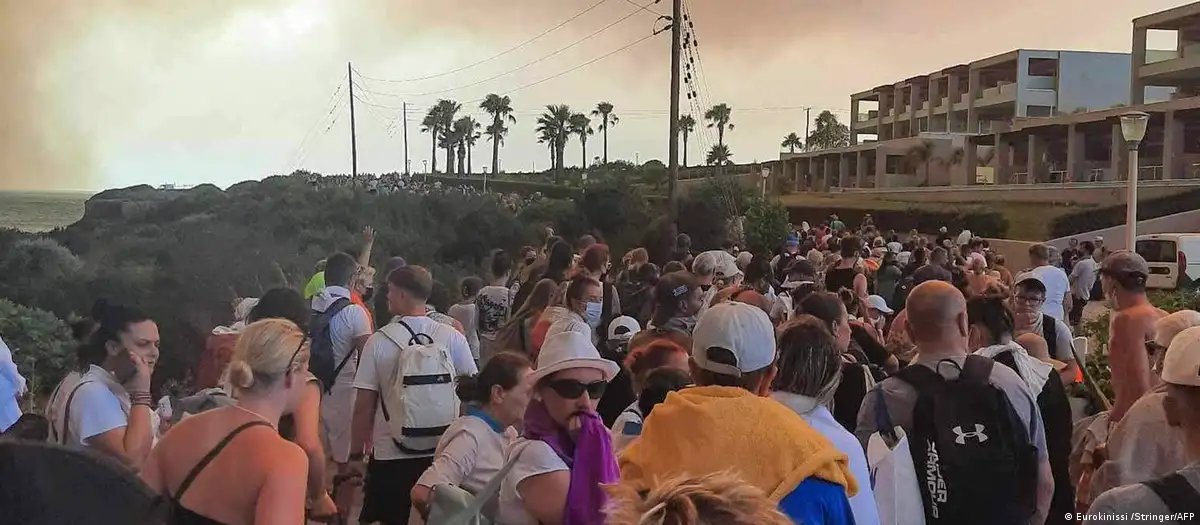BUSINESSGREECE
Wildfires: How will the tourism industry cope?
Lisa Stüve
21 hours ago21 hours ago
The devastating forest and bushfires in southern Europe are causing enormous economic damage. What does this mean for the locals and the tourism most of them depend on?
https://p.dw.com/p/4UbQw
Tourists are evacuated from hotels during a wildfire on the Greek island of Rhodes on July 22, 2023.
A wildfire on Rhodes raged out of control in July, making an emergency evacuation of tourist from the Greek island necessaryImage: Eurokinissi /Stringer/AFP
Images of tourists fleeing from fires on the Greek island of Rhodesand wildfires raging out of control in Sicily have dominated the headlines in European media, raising questions about whether the Mediterranean regon will remain a popular destination for summer vacations.
Mediterranean particularly affected
Scientists are convinced that extreme weather events, such as heat waves, will occur more frequently in Europe in the future. The region around the Mediterranean Sea is warming particularly rapidly, according to the World Meteorological Organization.
Parched soil under a scorching sun provides ideal conditions for spreading fires.
In April 2023, extreme temperatures were recorded in Spain, and the July heat wave was expected to be the longest in the history of recordings for Greece.
In July alone, over 50,000 hectares (123,000 acres) burned in Greece, which is slightly less than half the area of the German capital Berlin. Fires in Spain had reached this magnitude already at the beginning of April, according to data from the European Forest Fire Information System (EFFIS).
Throughout last year, an area of approximately 800,000 hectares, about the size of Montenegro, was destroyed within the EU. Estimated costs were at least €2 billion ($2.21 billion), said Janez Lenarcic, the EU Commissioner for Humanitarian Aid and Crisis Management, in January 2023.
A firefigthing plane releasing its water load over a fire in Altofonte near Palermo, ItalyA firefigthing plane releasing its water load over a fire in Altofonte near Palermo, Italy
The EU has doubled its aerial firefighting capacities in 2023 to prevent similar or even worse disasters than in previous yearsImage: Alberto Lo Bianco/LaPresse/AP Photo/picture alliance/dpa
Where there are fires, GDP declines
Uncontrollable fires that rage for days not only have devastating consequences for nature but also destroy livelihoods and harm the economy.
Sarah Meier, who researches extreme weather events and the economic impacts of fires at the University of Birmingham, says that where fires rage, gross domestic product (GDP) declines. “Employment figures for the tourism sector show that fewer people are employed after fires,” she told DW.
In the 27-nation EU, countries affected by wildfires can apply for assistance from Brussels. In Greece, for example, more than 500 firefighters from other countries were deployed, and the EU sent nine additional firefighting aircraft. All of this is covered by the EU’s disaster relief mechanism.
Moreover, funds for reconstruction can be tapped trough an EU solidarity fund on which, however, the European Parliament has the final say.
Evacuees sit inside a stadium following their evacuation during a forest fire on the island of Rhodes, Greece, Sunday, July 23,Evacuees sit inside a stadium following their evacuation during a forest fire on the island of Rhodes, Greece, Sunday, July 23,
The end of a 2023 summer holiday in GreeceImage: Argyris Mantikos/Eurokinissi/AP/picture alliance
Fires and tourism in Europe’s south
The travel industry is probably as important for Greece as the automotive industry is for Germany. About 20% of the Greek economic output comes from tourism. In Spain and Italy its 12% and 9% respectively.
However, southern European travel destinations could lose attractiveness in the long term due to heat and wildfires, which would harm the economy, international ratings agency Moody’s warned in a recent report.
The agency’s predictions, based on climate models, suggest that coastal regions as tourism destinations will significantly decline under various warming scenarios, while more northern countries could gain attractiveness.
Even though climate models predict heat, drought, and fires, “tourism in the Mediterranean region will not collapse overnight,” says Harald Zeiss, director of the Institute for Tourism Research at Germany’s Harz University. He told German TV channel ZDF that he expects traveling seasons could change, as tourists might prefer to take vacations in the Mediterranean region during spring or autumn rather than in summer.
“Wildfires and other extremes are perceived by people as isolated regional events and are not a deterrent, as humans tend to forget,” says Petro Beritelli from the Research Center for Tourism and Transport at the University of St. Gallen, Switzerland. He told DW that destinations like Dubai and Las Vegas show that extreme heat doesn’t deter people from traveling to such places.
Sustainable Travel – how does it work?
26:06
Innovations to the rescue of tourism
Johann Goldammer is the director of the Global Fire Monitoring Center (GFMC) in Freiburg, Germany, and suggests more innovations to contain forest and bushfires in the long run.
“Due to urbanization, too much land lies fallow, and when climate change, accompanied by dry periods and heat waves, exacerbates this, fires are practically inevitable,” he told DW.
Goldammer thinks that tourism should become “more sustainable and participatory.” Mass tourism must be curbed in favor of concepts that give travelers, for example, the possibility to help Greek farmers in their olive farms or on vineyards, he said.
After the devastating fires on the Greek island Euboea in 2021, Goldammer presented his proposals to the Greek government. They include a long-term land-use concept and measures to prevent fires. Instead of focusing solely on boosting firefighting capacities, prevention should take precedence, Goldammer said.
Portugal took concrete measure after damaging wildfires in 2017. In an effort to prevent them from happening, the government banned the replanting of eucalyptus trees, for example, because they ignite too easily. The latest data from EFFIS show fires in Portugal are less severe than in Spain, Italy, and Greece.
This article was originally published in German.






























